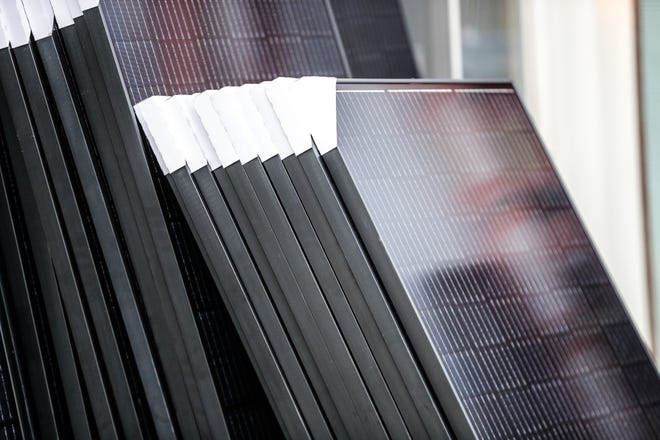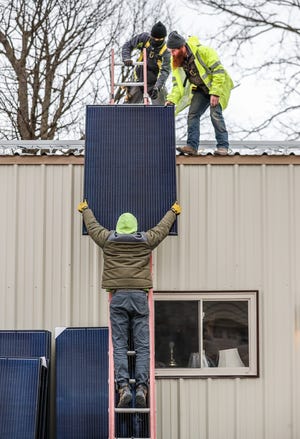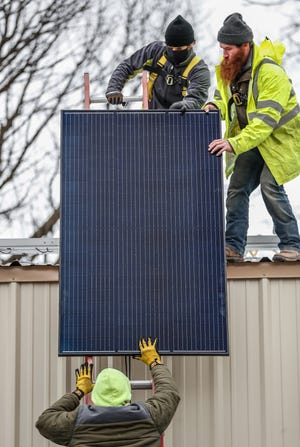Solar tax credits could be extended with COVID aid bill

Approaching next year, Indiana photo voltaic builders were being bracing for a surge in business as Hoosiers scrambled to install solar panels in advance of a federal tax credit rating could help you save them hundreds of pounds disappears.
Then, Congress reached an settlement on a COVID-19 reduction monthly bill, and every little thing modified.
The support bill, which may perhaps be voted on Monday, features $900 billion in help for those battling from the fiscal fallout of the pandemic. It also includes a two-year extension for the Solar Investment Tax Credit history, which was meant to period out for house owners by the conclude of subsequent yr.
The Solar Expenditure Tax Credit rating currently saves homeowners 26% of the price of their solar set up. Solar panel installations often exceed $10,000 in Indiana, this means the credit history can cut the price by more than $2,000.
Underneath the current section-out system, the credit history would drop to 22% soon after Dec. 31 this yr, and to % for owners by the end of following 12 months. Companies would however be capable to take a 10% tax credit rating after that.
If this relief invoice passes, even so, it could suggest two much more years of a tax credit that advocates say makes cleanse power far more affordable and supports financial development.
“The two-yr photo voltaic tax credit history extension will facilitate much more desire for residential and professional photo voltaic systems in our state which will, in switch, support to preserve solar installers used and perhaps support to encourage photo voltaic companies to retain the services of extra installers,” claimed Jesse Kharbanda, executive director of the Hoosier Environmental Council. “The solar tax credit history extension is a pragmatic ingredient of an overarching method to assist the economy get well.”
Congress is predicted to vote on the stimulus monthly bill Monday.
Surge in interest ahead of tax credit score deadline
In the past couple months, solar companies have seen their enterprise surge, as Hoosiers dashed to get solar panels installed on their homes ahead of the tax credit history dropped. 1 enterprise hired 12 new workers to assistance tackle the hurry. One more is in the process of opening a new locale.
“The sincere remedy is, we have been surprised by the resilience of solar, and the significant expansion we’ve viewed this 12 months, in the center of a incredibly sort of hard pandemic,” mentioned Steve Ricketts, a co-proprietor and manager at Photo voltaic Strength Solutions. “We’ve found people shift extra to photo voltaic in a pandemic yr than a regular 12 months.”
Phil Teague, co-founder and CEO of Rectify Photo voltaic, claimed his enterprise has found far more than a 50% strengthen in profits this year. He only expects the tempo to raise, specially as some individuals working from residence may be expanding fascinated in electrical power independence.
“People want to have that certainty, of performing from residence, possessing power if the grid goes down,” Teague explained. “That’s what has driven our enterprise to do development in profits this past yr.”

Most solar installers IndyStar spoke with had been anticipating even more robust fascination up coming yr, as it was the final year owners could obtain a tax credit score on solar jobs.
The 4-percentage-level drop in between 2020 and 2021 isn’t as very likely to change a homeowner’s intellect, professionals say — for a $10,000 set up, it would amount to about $400 in price savings. On the other hand, installing the exact same task prior to the credit history disappears entirely in 2021 would preserve them $2,200.
“When the tax credit history disappears entirely for residential photo voltaic, I expect it’s gonna make it unaffordable for a whole lot of men and women who had been on the fence or could just scarcely manage it or are nervous about expending a lot of cash, all at the moment,” mentioned Andrew Staffelbach, basic manager of Solar Electricity Techniques.
Scrub Hub:What is a eco-friendly power application, and how can it support me acquire renewable electricity?
If Congress’ help invoice is handed, even so, householders would have two more many years to put in panels at a reduce expense.
“We are all type of holding our breath until eventually everything’s finalized and signed,” mentioned Zach Schalk, Indiana system director for nonprofit Solar United Neighbors. “Assuming the deal is signed into legislation as we realize it … we think that it will just continue on to really encourage householders and companies to devote in photo voltaic and aid the field as it continues to mature.”
Solar shares boomed on Monday after Congress arrived at an arrangement on the invoice, which would incorporate a $600 stimulus payment for most and a $300 weekly supplement for individuals unemployed. It would also offer financial support to renters, smaller organizations, colleges and health care vendors, as properly as fund vaccine distribution.
Coverage a ‘driver of consumer behavior’
Coverage modifications that uproot small business are very little new for solar vendors.
“Do we refer to our market as remaining the ‘solar coaster?’ Yeah,” Ricketts claimed. “You can find generally political challenges… You can find usually up and down.”
A person of those “ups” occurred when the federal tax credit rating was initially applied in 2005. The credit was at first intended to expire in 2007, but was extended a selection of moments until eventually the multi-year phase out was established in 2015.
And one particular of the “downs” happened in 2017, when the Indiana Standard Assembly passed Senate Monthly bill 309. The bill phased out web metering, an incentive that reimburses folks for the power their solar panels produce into the electric powered grid.
The first phase of the net metering phase-out took spot on Dec. 31 that yr. If folks installed their solar panels before then, they would be eligible to retain net metering for a longer interval of time than those people who mounted panels in the next stage or just after the cutoff in 2022.
And, installers said, Hoosiers clambered to get gain.
“We haven’t witnessed a hurry like that prior to or because,” Staffelbach said. “But each individual slide we get a hurry, and the fact that the tax amount is likely down every 12 months is absolutely escalating the hurry.”

Advocates for solar power say this is proof that plan can identify no matter if or not anyone buys solar energy, and that the credit history must be reinstated or prolonged to promote clean energy and energy independence.
“It actually underscores how plan can seriously be a driver of client habits,” said Kharbanda of the Hoosier Environmental Council. “I do think there is wide base fascination in families wanting to lower their environmental footprint.”
Although Photo voltaic Electricity Devices has witnessed a very similar increase in enterprise this slide, Staffelbach reported he’s anticipating at the very least some hit in household installations right after the household tax credit rating ends.
But there’s even now really a bit of organization in professional initiatives, he reported. The rate of solar, which has fallen by 82% in the final ten years, tends to make the choice a no-brainer for most firms, specifically taking into consideration they will however be capable to get 10% back from the tax credit.
“Even without a tax credit history, it is still … guaranteed financial commitment, for the reason that they know it can be heading to minimize their power expenditures, there’s no threat associated,” Staffelbach said.
Kendall Ludwig, the Indiana branch manager for GRNE Solar, mentioned he has witnessed improved fascination from utilities and other organizations these as nonprofits looking for ways to slice expenses.
“I do not feel its heading to slow down at all,” Ludwig stated, “just mainly because these other markets are raising.”
Hope for an extension
Photo voltaic power is one particular of the speediest-rising position marketplaces in the state, according to the U.S. Bureau of Labor Data, incorporating 51% extra work from 2019 to 2020 by itself.
Advocates issue to this as proof that extending the tax credit history or repealing the web metering period-out would only serve to strengthen employment and the economic climate, particularly as the pandemic leaves hundreds of thousands of folks unemployed in its wake.
“Huge-image intelligent, the economy has never ever been as challenging of a spot as since the 1930s. That there is a genuine scenario to extend the federal tax credit score,” Kharbanda said. “It will unequivocally enable the market have out installations, which will translate into far more work opportunities.”

Advocacy groups, together with the Hoosier Environmental Council and Solar United Neighbors, also plan to fight the Indiana web metering section-out this approaching legislative session. But this calendar year may well verify nonetheless another challenge as legislators’ awareness is directed towards the ongoing COVID-19 pandemic and economic crisis.
Under the current net metering period-out, people today who put in photo voltaic panels prior to the initially stage of the period-out in 2017 have entire internet metering credit history till 2047. Below the second stage, individuals who install just after that cutoff, but ahead of July 2022, will have whole net metering credit right until July 2032.
These who install photo voltaic panels soon after July 1, 2022 will not be qualified for entire internet metering credit rating.
“It seems like a huge missed chance for our state to continue down the path we’re on,” Schalk mentioned. “We shouldn’t be placing up new purple tape, new headwinds in that market correct at the time when we require as numerous employment as we can get.”
Energy:Here’s what the Indiana Coal Council and other teams want for the state’s energy future
The law that phased out web metering also necessary the Indiana Utility Regulatory Commission to set up a new, despite the fact that decreased, credit fee for extra energy created from solar panels back into the grid. It also allows utilities to petition for net metering to finish for their consumers just before July 2022.
Vectren was the first utility to petition the IURC for permission to end internet metering quicker, on January 1, 2021.Their proposal has not still been accredited, and stays with the IURC. Other utilities have right until March to file similar petitions.
While anticipating some headwinds in the coming yrs, all solar installers IndyStar spoke with claimed they were not nervous about the future of the business in Indiana. The tax credit’s drops and extensions are just element of a series of ups and downs seasoned by the sector, Ricketts claimed.
“The lessen in cost is often going to be what drives this business,” Ricketts reported, “and costs are going to continue to drop, slide and slide.”
Speak to IndyStar reporter London Gibson at 317-419-1912 or [email protected]. Abide by her on Twitter @londongibson.
Connect with IndyStar’s environmental reporters: Join The Scrub on Fb.
IndyStar’s environmental reporting task is made achievable through the generous assist of the nonprofit Nina Mason Pulliam Charitable Trust.


